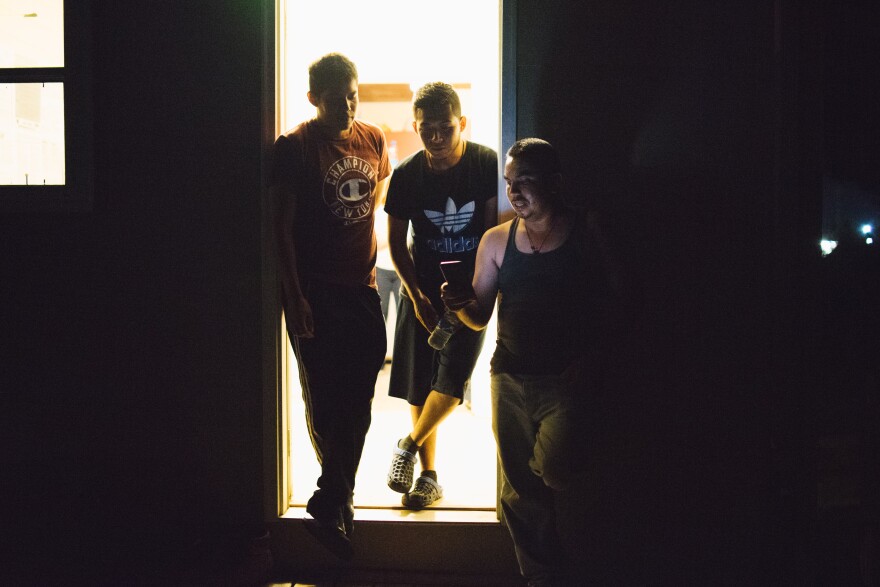Migrant farmworkers in rural areas face a lot of pressure -- from language barriers, to geographic isolation, to the current political climate surrounding immigration. Add in the limited access to mental healthcare in rural locales, it puts workers who travel to Western North Carolina for the harvest season in an even tougher position.
At a migrant camp in Franklin, NC, it’s a humid, late summer evening . The sun has gone down, but the air is still hot and thick. A group of young men are standing outside a small cabin on the side of a hill. They’re trying to cool off after a full day laboring under the sun, some have taken their shirts off.
But they seem laid back. No complaints, says Miguel Angel Cornao Gallegos.
“To me it's all good, everything's fine,” he said.
He and his peers seem to brush off questions about how they’re doing. How they’re managing the stress associated with their jobs. Days that can stretch 12 to 14 hours. Living in an isolated place. Being thousands of miles away from family.
“The work keeps you so busy and tired...you don’t have time to think about anything else, except for doing the job,” Cornao Gallegos said.
They’re grateful. They seem to say.

But it’s also worth noting that it’s not easy to open up to strangers about emotions on the first meeting -- especially around peers. Particularly within the Latinx community, talking about mental health can be stigmatized, and a culture of machismo adds to the challenge.
“In my own family, I know that you didn’t really speak about your feelings,” Jackie Antiveros, an outreach coordinator for Blue Ridge Health in Hendersonville, said.
“I remember one time I told my siblings ‘you hurt my feelings’ and everyone laughed. You just don’t speak about it," Antiveros, who's Mexican-American said. “You bring that onto a man, you’re here to work, to provide for your family, you’re not here to speak about your emotional wellbeing, what you’re feeling.”
Blue Ridge Health and other providers across the state that work with the migrant farmworker population are increasingly focusing on mental health concerns, like depression and anxiety.
Almost by accident, Antiveros discovered a way to break through some of those cultural barriers. It started in July, when she went on a standard intake visit to a migrant camp -- but decided to bring along markers and paper. She invited the men to draw home, and what they miss.
“A lot of these guys, they’re jokesters, so at the beginning of the presentation, they were just saying things like, 'I miss the food from Mexico,” Antiveros said.

But she says the tone shifted when one man named Xavier showed his drawing. It read, “Lo que extraño más de México es la libertad.”
“He said he missed the freedom that he had in Mexico,” Antiveros said. “Everyone kind of got quiet and they were like ‘oh yeah, that’s really true.' That was something they didn’t realize they missed until someone brought it out.”
She says it opened up a space for them to talk about their feelings and realize they weren’t alone. From there, she was able to encourage them to access the clinic’s counseling services.
“Breaking that ice and saying, ‘actually, I’m here to help you as a whole entity, I want to get to know you, I want to dig deeper,’ has helped them see it’s okay to talk about your emotions,” Antiveros said.
“To say, ‘I promise I’m not going to think of you as less than a man, or less of a worker, and I'm not going to think of you as weaker because you're telling me how it is you’re feeling after the death of your father or how it is you're feeling because your wife is missing you.’”
Which brings us back to the worker’s camp in Franklin. The group of men are headed inside the kitchen for dinner, carnitas and black beans. David Cruz Lopez stood alone outside in the darkness. His face was lit by the cell phone in his hand.
“I feel sad,” he said. “Because my girlfriend in Mexico, she just broke up with me."
Lopez says they were together for four years.
“It was over the phone, not in person,” Lopez said. “The reason is because I left to work here in the United States. She says now 'I don’t want to be with you because you’re so far away it’s not going to work.' And now, I’m sad.”
He brushed off a tear, and headed inside to join his peers. Cruz has to eat dinner, get some sleep, and work another day.
The second part of this series is available here.





